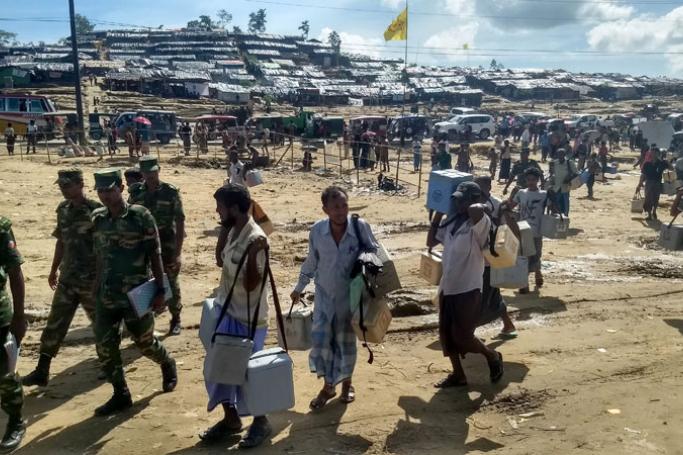The United Nations launched one of its biggest ever cholera vaccination drives in the vast refugee camps of southeast Bangladesh Tuesday amid fears of an outbreak among nearly a million Rohingya now living there.
Thousands of Rohingya men and women lined up in intense heat at makeshift health centres, many with young children in their arms, to receive the oral vaccine against the disease.
The UN is working with the Bangladesh government to vaccinate 650,000 people living in the sprawling camps against cholera, which spreads through dirty water and can kill if left untreated.
"These people lack most of the basic services -- toilets, water sanitation and everything," UNICEF spokesman A M Sakil Faizullah told AFP.
"When we have this kind of situation, there's a heavy possibility of a cholera outbreak."
Nearly 520,000 Rohingya Muslims have arrived in Bangladesh since late August, fleeing a military crackdown in mainly Buddhist neighbouring Myanmar that the UN has said likely amounts to ethnic cleansing.
Poor and overpopulated Bangladesh has struggled to cope with the mass influx of people, many of whom have to travel for days or even weeks to reach safety and arrive exhausted and malnourished.
The influx had slowed in recent weeks, but now appears to have picked up again and an estimated 11,000 new refugees arrived on Monday.
The UN refugee agency said Tuesday it was working with the Bangladesh authorities to set up a transit centre in preparation for a fresh influx from Myanmar's Rakhine state.
World Health Organization (WHO) workers and local volunteers will vaccinate 650,000 Rohingya over the coming weeks and then follow up with a second dose of the vaccine for an estimated 250,000 children aged between one and five.
It the second biggest such campaign ever, after 800,000 people were immunised against the disease in Haiti in November.
The WHO's Bangladesh representative N Paranietharan called it a "huge undertaking" and said he was confident an outbreak would be averted.
He said thousands of Bangladeshis living near the refugee camps would also be vaccinated.
Cholera was a major killer in Bangladesh until in the 1970s, but the country has seen major improvements in sanitation facilities since then.
(AFP)
You are viewing the old site.
Please update your bookmark to https://eng.mizzima.com.
Mizzima Weekly Magazine Issue...
14 December 2023
Spring Revolution Daily News f...
13 December 2023
New UK Burma sanctions welcome...
13 December 2023
Spring Revolution Daily News f...
12 December 2023
Spring Revolution Daily News f...
11 December 2023
Spring Revolution Daily News f...
08 December 2023
Spring Revolution Daily News f...
07 December 2023
Diaspora journalists increasin...
07 December 2023
Tatmadaw and Arakan Army are in talks












